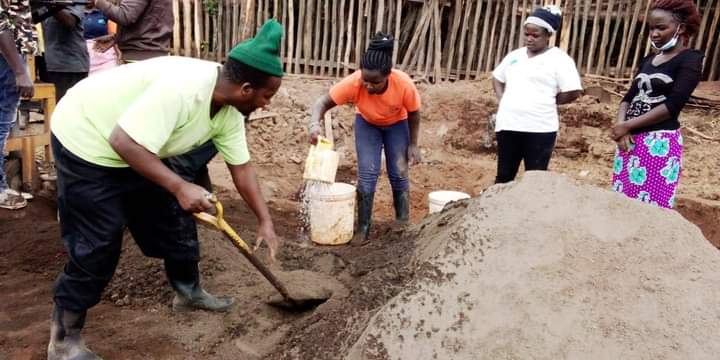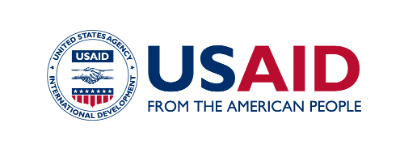News > Blog
Vision 4 Housing: A Kenya Case Study
Published 01/31/2022 by Global Communities
U.S. Agency for International Development (USAID) Cooperative Development Program – Cooperative Leadership, Engagement, Advocacy & Research (CLEAR)
Vision 4 Housing Cooperative got off to a rocky start. Originally set up as a community-based organization (CBO) in Kenya, its members became overextended managing multiple projects. One of those was a promising cyber café that offered digital and printing services to community members, but it ended up being shut down — a casualty of the CBO’s lack of business experience.
Instead of folding, the Vision 4 members re-grouped. Most of them live in an informal settlement surrounding Kaptembwa in Nakuru County. Like many informal settlements, the area is characterized by dilapidated houses, poor drainage and polluted water and air. To address these challenges, members put their savings together to raise a substantial amount of capital and reoriented their activities toward housing and construction. They set a goal of building modern houses, not only to improve living conditions for their members but also to improve their overall community’s stability and health. Vision 4 Youth Housing Cooperative Society Limited was registered in 2014.

Photo by Global Communities Kenya staff.
TRANSITIONING FROM CBO TO COOPERATIVE
The transition from a CBO to a cooperative was not easy. One of the major concerns was that operating as a cooperative would force members to pay taxes and their business would be monitored by the government. As a CBO, members had enjoyed the freedom to do whatever they wished. Even so, that freedom came with a few downsides. For example, without the structure of a constitution or policies, the leaders often dictated the terms of engagement without consulting members. Furthermore, sometimes members would withdraw from the CBO without notice and demand their money back.
After hosting various meetings and discussions to explore the cooperative business model, a notice was given, and interested members began working together to ensure a smooth transition. They identified potential shareholders and board members and filed incorporation documents with the Cooperatives Registrar to make their housing cooperative a legal business entity. Members then formed a steering committee to write the bylaws and agree on the new structure based on the 7 Cooperative Principles. A total of 160 members transitioned to the newly formed cooperative, which took about four years to be fully operational after registration.
2014
became a registered cooperative
120
members
12
board members
45%
women members
To understand how a cooperative works, members underwent training that helped them put in place the structure and organization they now follow. The cooperative currently has over 120 members, ranging in age from 18 to 50 years old. Membership is based on shareholding, and in order to maintain membership in the cooperative, members must adhere to policies and guidelines they themselves established and agreed upon. Members, including the board, have had the opportunity to attend trainings that have given them the skills to adequately perform their duties. Every year, the cooperative is audited and a general meeting is held to discuss emerging issues, elect committee members and confirm financial accounts.
All of these steps have led to a sense of trust and common vision.
“The goodness about cooperatives is each for all and all for each,” said Vision 4 Housing board member Boniface Okumu.
“Even if there is no work, members have something to hold onto.”
Judy Boyani, Vision 4 Housing Cooperative member
IMPROVING GENDER EQUITY & GOOD GOVERNANCE
The COVID-19 pandemic had a significant impact on Vision 4 Housing’s construction contracts. However, unlike many other businesses that were forced to close, the cooperative provided members with an opportunity to build their way to more economic stability. Women were taught how to bead, make table mats and make soap, allowing them to earn an income to support their families. The cooperative also hired a group of women who offer catering services to provide meals during cooperative member meetings and at construction sites. In doing so, the cooperative helped add value to these traditional economic activities, especially for women, and helped facilitate market access.
Thanks to a partnership with Global Communities’ CLEAR Program, under the USAID Cooperative Development Program, members of the cooperative have also benefited from a series of trainings on Gender, Good Governance and Equity. This has led to increased participation by women in the cooperative’s operations, and young people have become more engaged as well. They are contracted on a daily basis to make interlocking blocks to be used by the cooperative in the construction of modernized housing for members.
“During the last elections, two women were elected in the supervisory committee, and our secretary is also a woman,” said Sammy Asava, former chair and member of Vision 4 Housing Cooperative. “We are seeing more women participate in the elections process than before, thanks to the trainings by Global Communities.”
SHOWING CONCERN FOR THE COMMUNITY
In terms of the broader community of Kaptembwa, the cooperative decided to take action against the open dumping of garbage in nearby rivers, streets and walkways.
Vision 4 Housing collaborated with the Nakuru County Government to develop a solution to this problem by establishing an informal waste recycling program. Previously, members had no place to dump their waste and were forced to do so on the sides of roads and in other illegal areas. Now, they are incentivized to collect waste from their homes and deliver it to a planned dumpsite on cooperative grounds. When they deliver the waste, they earn points and, through an award system, can win gifts. The waste is separated according to material (plastic bottles, glass and paper) and weighed before being sold to creators who make finished products for use.
According to Asava, approximately 100 community members deposit waste at the cooperative’s dumpsite every month. This has reduced garbage around the streets and the neighborhoods but more needs to be done. The cooperative’s dumpsite is not big enough to accommodate waste from the entire community, so the hope is to expand their grounds to allow for more waste collection. They are also seeking partnerships with officially registered garbage collectors who can frequently clear the dumpsite to allow more members to discard waste there.
Through these activities and others on the horizon, Vision 4 Housing has proven that cooperatives can create income-earning opportunities that protect the environment, promote community participation and encourage an entrepreneurial spirit. Cooperatives are not only sustainable businesses but partners in locally-led community development.
Vision 4 Housing Cooperative, Fidel Wambiya, Tindi Sitati, Diana Macharia and Mike Kipngeno contributed to this case study. Download a copy here.

This case study is made possible by the generous support of the American people through the United States Agency for International Development (USAID). The contents are the responsibility of Global Communities and do not necessarily reflect the views of USAID or the United States Government.





